|
LES TRULLI OU
CASEDDE D'ALBEROBELLO (PROVINCE DE BARI, ITALIE)
À TRAVERS LES CARTES POSTALES ET PHOTOS ANCIENNES
The trulli or
casedde of Alberobello, province of Bari, Italy,
through old postcards and photos
Christian Lassure
II - PHOTOS OF THE
FIRST HALF OF THE 20th CENTURY
French version
Bilingual
French-English version
|
DOCUMENT 1 |
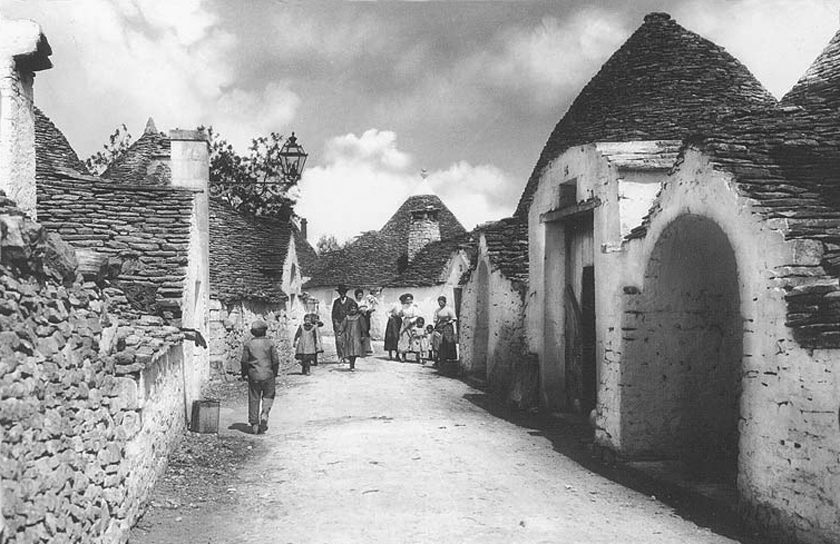 |
|
This early 20th-century photo shows a narrow street – i.e. via Colombo – into which a
few residents – mostly women and children, the mensfolk being presumably out at
work – have come out on being warned of a photographer's arrival. The
revetment of the street – or lane to be precise – is earth, there is
no gutter in sight. A gas lamp is affixed to an ashlar chimney stack on the left
hand side, indicating that public lighting had already come to Alberobello at
the time. On the right-hand side, one can see two entrance porches covered by a
semi-circular vault underneath a two-sided stone roof, and in between, a tall
large cart entrance covered by a wooden lintel underneath a surbased stone roof.
A pedestrian entrance is cut out of the wide wooden door of what is presumably a
cart store as evinced by a bollard on the left. The curvilinear profile of the
large right-hand stone roof stands out in contrast to the rectilinearity of the
cone with the white pinnacle that looms in the distance. The façades are rendered
with mortar and whitewashed (photo of unknown origin). |
|
|
|
DOCUMENT 2 |
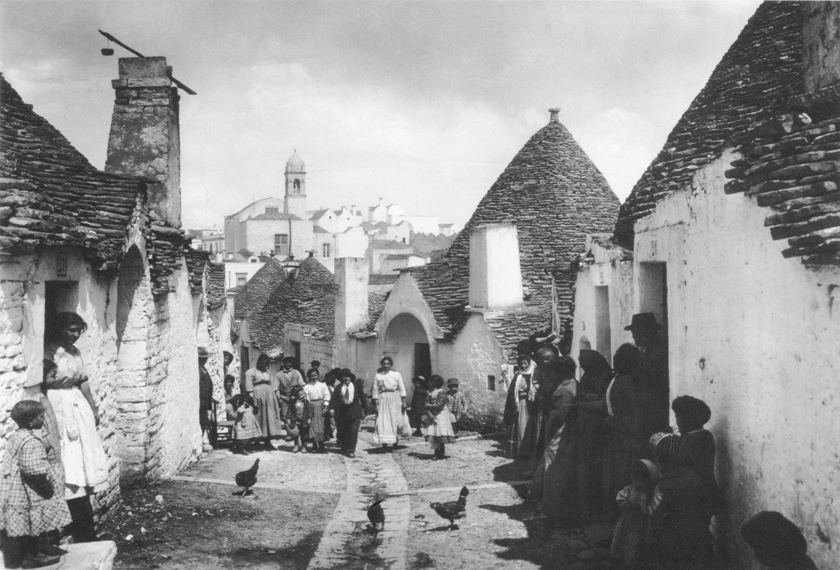 |
|
In the Monte Nero street (via Monte Nero) in the Monti district (rione
Monti) as photographed by the Alinari photographers circa 1920, the residents
are outside their casedda – in local parlance – or trullo
– in Italian. Here too, the people are mostly women and children. There
is no trace of public lighting, running water and mains drainage. The street
surface revetment is earth and gravel, with a central gutter made of large stone
slabs. The chimney stack on the left-hand side is fitted with a wooden top that
tilts up or down according to where the wind is blowing from. A number of houses
have their entrance covered by a stone lintel, others are fronted with a small
porch covered by a semi-circular vault under a two-sided stone roof. Where the
street turns, there stands out an impressive curvilinear cone fronted with a
large porch next to what appears to be a room for a fireplace (photo reprinted
in a recent postcard). |
|
|
|
DOCUMENT 3 |
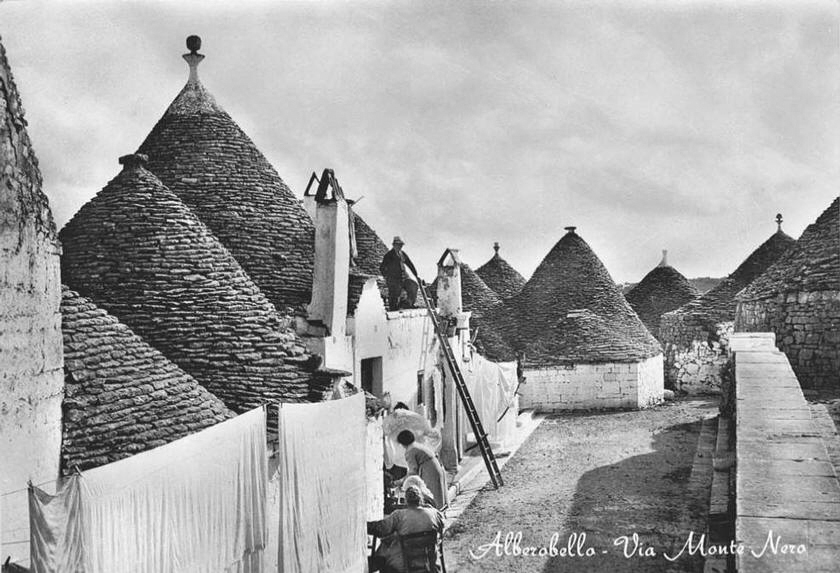 |
|
In this view taken in the 1950s, the Monte Nero street seems to end as a
cul-de-sac (although a right turn is not to be ruled out). The road surface
consists only of earth between two slab-built gutters. The document's interest
lies not so much in the animated scene that is depicted in it as in the
architectural details that are featured in it: in the foreground, on the left,
white sheets are hung out to dry on a clothes line held up by perches; two women
sitting outside are having a chat while a third one is busy hanging out the
washing (?); a man is perched on top of the façade wall of a house (with its
telltale smokestack); the tall ladder leaning against the façade points to the
way trullo roofs are accessed (for lack of inside access). The large cone
roof above the house boasts a rectilinear profile and a composite carved
pinnacle, two features indicative of recent construction or restoration. The
chimney stacks are capped with opposite machine-made tiles. To the left of the
house, the small curvilinear cone roof topped by a stone disk is of a later
date. The tall poles in the background are electricity poles (courtesy of the
Electricity Fairy). |
|
|
|
DOCUMENT 3 - détail |
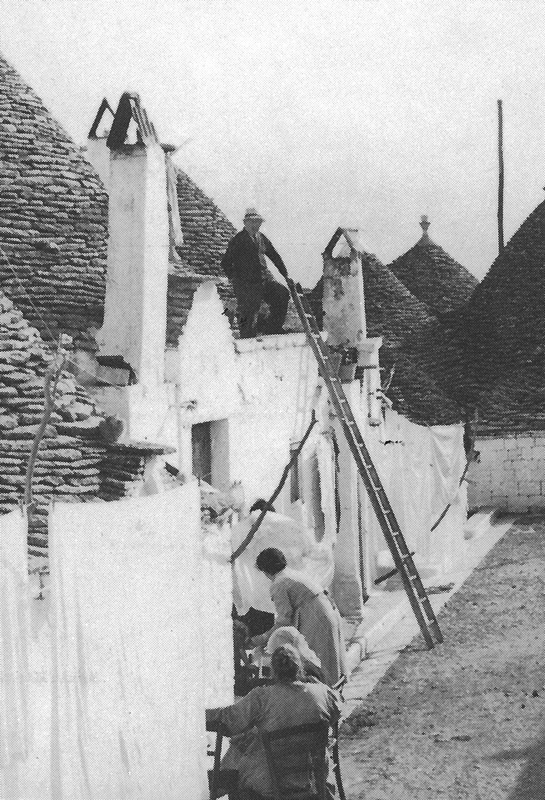 |
|
Zooming in on the animated scene outside the house. |
|
|
|
|
DOCUMENT 4 |
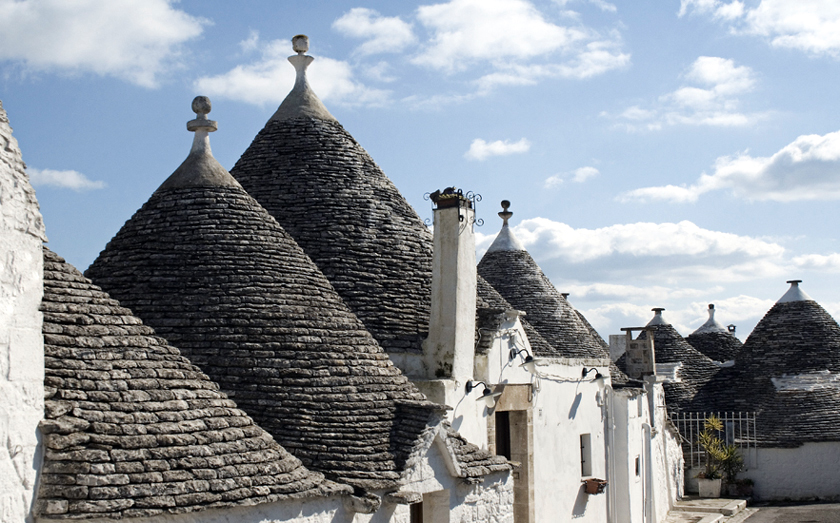 |
|
The same row in the mid-2000s. A strange device with
wrought-iron fittings has been substituted for the mitre at the top of the tall
chimney stack. The other two chimney stacks that stood behind it have vanished
while a new one has sprung up above the front wall of the house at the far end
of the row. Two of the roof cones boast a whitewashed, albeit faded, symbol
(they did not have any in the 1950s). At the top of the second cone from the
left of the picture, the initial stone disk finial has acquired a more slender
base and serves as a support for a ball. At the far end of the cul-de-sac, a
private area has been shut off by metal railings. Finally, the front of the
house with the ladder (in the 1950s postcard) has been fitted with three
wall-mounted electric lamps for nighttime lighting. (This photo originates from
a page entitled "Les Pouilles, pays des trulli", in the "Plaisirs,
gastronomie et voyages" website). |
|
|
|
DOCUMENT 5 |
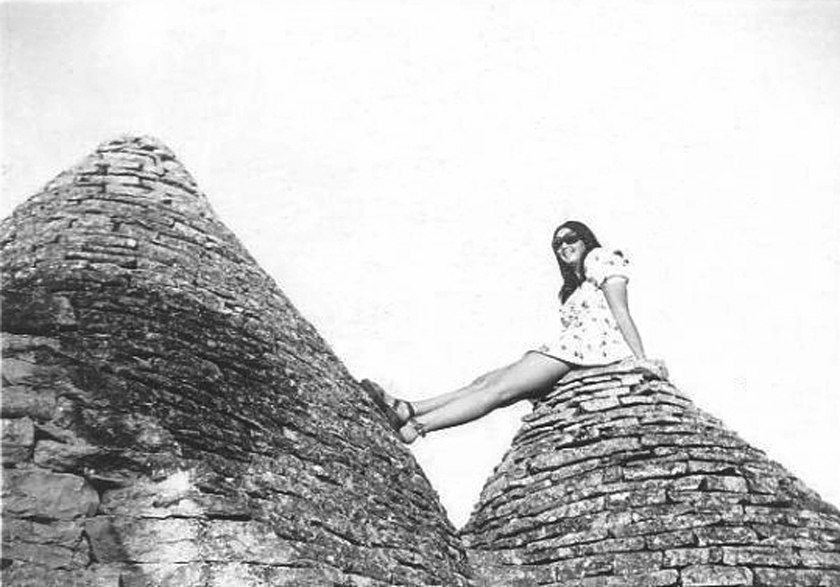 |
|
It would be vain to believe that all trullo cones are capped
with a carved pinnacle; some of them are crowned simply by a large circular
slab, access to which is by a flight of steps built into the stone roof. But for
the steps and slab, the agile young lady in the picture would not have made it
to the top and sat on the crowning slab for a photo op. (photo origin: pending
identification). |
To print, use landscape mode
© CERAV
This page remains subject to additional edits
January 5th, 2011 - Augmented on January 8,
2011 - January 20th, 2011 - February 12th, 2011 - June 22nd, 2011 - March 6th,
2018
To be referenced as :
Christian Lassure
The trulli or casedde of Alberobello, province of Bari, Italy,
through old postcards and photos
II - Photos of the first half of the 20th
century (version en anglais)
http://www.pierreseche.com/alberobello_photos_angl.htm
5 janvier 2011
I - Les trulli. Résumé historique et architectural
Trulli. A historical and architectural summary
II - Photos of the first half of the 20th century
Photos de la première moitié du XXe siècle
III - The changing face of via Monte Pertica in the Monti district (1950-2010)
IV -
L'hôtel des
trulli
The Hotel of theTrulli
V -
Rione Monti, via Monte Santo
VI -
Rione Monti, via Monte Sabotino
VII - Rione
Monti, via Monte San Michele
VIII - Rione Monti, via Monte Nero
(en construction)
IX - Rione Monti, via Monte Pasubio
(en construction)
X -
Rione Monti, via Monte San Gabriele
XI -
Rione Monti, via Duca d'Aosta
XII - Rione Monti, piazza d'Annunzio
(en construction)
XIII - Rione Monti, vico d'Annunzio
(en construction)
XIV - Rione Monti, Chiesa de Sant' Antonio
XV - Rione Monti, panorama della zona monumentale "Principe de
Piemonte" (en construction)
XVI - Rione Aia Piccola, piazza Plebiscito
XVII - Rione Aia Piccola, via Giuseppe Verdi (en construction)
XVIII -
Rione Aia Piccola, via Duca degli Abruzzi
XIX -
Rione Aia Piccola, via Galilei
XX - Il Trullo Sovrano
(en construction)
XXI -
Via Monte Calvario
XXII - Via Monte Grappa
(en construction)
home page
|






